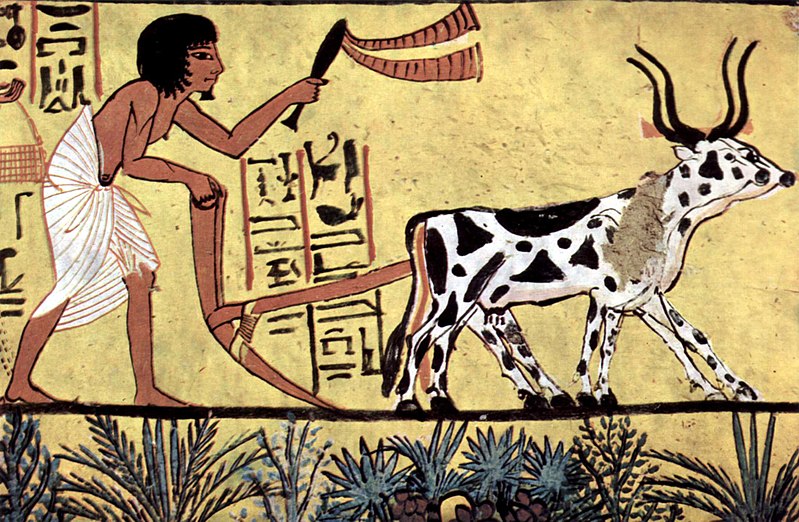The advent of agriculture is a pivotal moment in human history, marking the transition from hunter-gatherer societies to settled communities. Scientific research and archaeological evidence provide valuable insights into the timeline of when agriculture truly began.
1. The Fertile Crescent: Birthplace of Agriculture
One of the earliest cradles of agriculture is the Fertile Crescent, a region in the Middle East that includes parts of modern-day Iraq, Syria, Lebanon, Israel, and Jordan. Around 10,000 BCE, in a period known as the Neolithic Revolution, evidence suggests that humans in this region began cultivating crops and domesticating animals.
2. Domestication of Plants and Animals
Archaeological findings indicate that early agricultural practices involved the cultivation of key crops like wheat, barley, and legumes. Concurrently, humans began domesticating animals such as goats, sheep, and cattle. This shift from a nomadic lifestyle to settled farming communities allowed for a more reliable food supply.
3. Transition from Wild to Cultivated
Researchers believe that the domestication process involved selecting and cultivating plants with desirable traits, such as larger seeds or more abundant yields. Over generations, this led to the development of crops that were distinct from their wild ancestors. Similarly, animals were selectively bred for traits that suited human needs.
4. Spread of Agriculture Around the Globe
As agriculture took root in the Fertile Crescent, similar practices emerged independently in other parts of the world. In China, rice cultivation began around 7,000 BCE, while in the Americas, corn (maize), beans, and squash were domesticated around 9,000 BCE. The timeline of agricultural development varied across different regions due to environmental and climatic factors.
5. Impact on Human Societies
The shift to agriculture had profound implications for human societies. Surplus food allowed for larger populations, leading to the rise of complex civilizations. The development of settled communities laid the foundation for advancements in technology, trade, and culture.
6. Challenges and Innovations
While agriculture brought numerous benefits, it also presented challenges such as land management, irrigation, and pest control. Over time, humans developed innovative solutions, including the invention of plows, irrigation systems, and crop rotation.
In conclusion, the origins of agriculture can be traced back to the Neolithic Revolution in the Fertile Crescent around 10,000 BCE. This pivotal moment in human history not only transformed how societies obtained food but also set the stage for the development of civilizations worldwide. Through scientific research and archaeological discoveries, we continue to unravel the complexities of our agricultural heritage.
- The Role of Climate and Geography*
The success of early agricultural practices was closely tied to the climate and geography of specific regions. The Fertile Crescent, for instance, had a Mediterranean climate, featuring fertile soils and a variety of wild plant and animal species suitable for domestication. This favorable environment contributed significantly to the agricultural revolution.
8. Technological Advancements in Agriculture
As societies embraced agriculture, technological innovations played a crucial role in enhancing productivity. The transition from simple hand tools to more sophisticated implements like plows and sickles marked a significant leap. These innovations allowed farmers to cultivate larger areas and improve efficiency.
9. Cultural and Social Impacts
The shift to agriculture not only reshaped economies but also had profound cultural and social impacts. The concept of land ownership emerged, as people settled in specific territories. This led to the establishment of permanent settlements, fostering the development of complex social structures and organized governance.
10. Evolution of Crop Diversity
Over centuries, the practice of agriculture led to the cultivation of a diverse range of crops, each adapted to specific regions and climates. This diversity not only ensured food security but also enriched culinary traditions and dietary habits across different cultures.
11. Challenges to Agricultural Sustainability
While agriculture brought prosperity, it also introduced challenges related to sustainability. Deforestation, soil degradation, and over-exploitation of resources became issues that required careful management. Sustainable farming practices, such as crop rotation and agroforestry, emerged as responses to these challenges.
12. Modern Agricultural Revolutions
The 19th and 20th centuries witnessed further transformations in agriculture with the advent of industrialization. Mechanization, synthetic fertilizers, and pesticides revolutionized farming practices, significantly increasing yields but also raising concerns about environmental impact and sustainability.
13. Genetic Engineering and the Future of Agriculture
In recent decades, advancements in biotechnology have opened new frontiers in agriculture. Genetic engineering allows scientists to modify crops for enhanced resistance to pests, diseases, and environmental stress. While this technology holds promise for addressing global food security, it also raises ethical and environmental considerations.
14. Conclusion: A Continual Journey
The story of agriculture is an ongoing narrative of adaptation, innovation, and challenges. From its humble beginnings in the Fertile Crescent to the sophisticated practices of today, agriculture continues to shape the destiny of humanity. As we navigate the complexities of a changing world, understanding our agricultural heritage remains essential for building sustainable and resilient food systems for future generations.
- Globalization and Agricultural Exchange*
In the modern era, globalization has facilitated the exchange of agricultural practices, technologies, and crops across the globe. The interconnectedness of economies has led to the widespread dissemination of knowledge, enabling farmers to learn from diverse agricultural traditions and implement best practices.
16. Climate Change and Agricultural Resilience
The challenges facing agriculture today are exacerbated by the impacts of climate change. Erratic weather patterns, rising temperatures, and extreme events pose threats to crop yields and food security. Agricultural communities are actively engaged in developing resilient practices and adapting to the changing climate.
17. Sustainable Agriculture Movements
Amid concerns about environmental degradation and the depletion of natural resources, sustainable agriculture movements have gained momentum. Practices such as organic farming, permaculture, and agroecology prioritize environmental stewardship, biodiversity conservation, and the well-being of farming communities.
18. Digital Agriculture and Precision Farming
The 21st century has witnessed the integration of digital technologies into agriculture. Precision farming utilizes data-driven approaches, including sensors, drones, and artificial intelligence, to optimize crop management. This technological leap enhances efficiency, minimizes resource use, and contributes to more sustainable farming practices.
19. Agricultural Education and Research
Investments in agricultural education and research play a pivotal role in addressing contemporary challenges. Scientists and researchers explore innovative solutions to improve crop yields, enhance nutritional content, and develop crops resilient to pests and diseases, contributing to the ongoing evolution of agriculture.
20. The Future of Agriculture: Challenges and Opportunities
Looking ahead, agriculture faces formidable challenges, including a growing global population, resource scarcity, and the need for sustainable practices. Embracing regenerative agriculture, fostering agroecological approaches, and promoting equitable access to resources are key components of a resilient and sustainable agricultural future.
21. A Call for Global Collaboration
As we navigate the complexities of the 21st century, addressing the challenges of agriculture requires a collaborative global effort. Governments, researchers, farmers, and consumers must work together to create policies, practices, and systems that ensure food security, environmental sustainability, and the well-being of farming communities worldwide.
In conclusion, the journey of agriculture is a dynamic and ever-evolving story. From its origins in ancient civilizations to the cutting-edge technologies of today, agriculture remains a cornerstone of human civilization. Navigating the path forward requires a commitment to sustainability, innovation, and collaboration to ensure a resilient and thriving agricultural future for our planet.
- Social and Economic Dynamics*
The impact of agriculture extends beyond the cultivation of crops; it profoundly influences social and economic structures. The establishment of agrarian societies gave rise to specialized labor roles, trade networks, and economic systems. The surplus food generated by agriculture became a commodity, fostering economic development and trade.
23. Cultural Heritage of Agriculture
Cultivation practices and farming rituals have woven themselves into the cultural fabric of societies. Festivals, ceremonies, and traditional agricultural practices celebrate the interconnectedness between humans and the land. The diversity of agricultural traditions worldwide contributes to the rich tapestry of global cultural heritage.
24. Challenges in Rural-Urban Dynamics
Urbanization and industrialization have led to significant shifts in population demographics, with more people moving from rural to urban areas. This transition presents challenges in maintaining sustainable agricultural practices, preserving rural communities, and ensuring a balanced and equitable development between urban and rural regions.
25. Gender Dynamics in Agriculture
The role of gender in agriculture has evolved over time. Traditionally, agricultural tasks were often gender-specific, but contemporary agriculture sees a more equitable distribution of roles. Recognizing the contributions of women in farming and addressing gender disparities is essential for fostering inclusive and sustainable agricultural practices.
26. Ethical Considerations in Agriculture
As agriculture advances, ethical considerations come to the forefront. Issues like fair labor practices, animal welfare, and the responsible use of technology require careful attention. Ethical frameworks in agriculture guide decision-making to ensure that progress aligns with principles of justice, equity, and environmental responsibility.
27. Agricultural Policies and Global Governance
Governments worldwide play a crucial role in shaping agricultural policies that impact farming practices, food production, and distribution. International organizations contribute to global governance by addressing issues such as trade agreements, food security, and sustainable development, emphasizing the interconnectedness of agricultural systems on a global scale.
28. Resilience in the Face of Pandemics
Recent global events, such as the COVID-19 pandemic, underscore the need for resilient agricultural systems. The pandemic highlighted vulnerabilities in food supply chains, emphasizing the importance of building robust and adaptable systems that can withstand shocks and disruptions.
29. Public Perception and Consumer Choices
Consumer awareness about the environmental and social impacts of agriculture is growing. Sustainable and ethical farming practices are increasingly influencing consumer choices. This shift in demand encourages farmers to adopt environmentally friendly practices and reinforces the importance of transparency in the agricultural supply chain.
30. The Uncharted Frontiers of Space Agriculture
Looking to the future, space agriculture represents a novel frontier. Research into cultivating crops in space environments aims to address the challenges of sustaining human life on long-duration space missions and potentially support future colonies on other planets.
In conclusion, the story of agriculture is multifaceted, encompassing scientific, social, economic, and ethical dimensions. As we navigate the complex landscape of modern agriculture, it is essential to recognize its far-reaching implications and work collaboratively to ensure a sustainable and equitable future for global food systems. The evolving narrative of agriculture continues to shape our world, offering both challenges and opportunities for future generations to explore.




